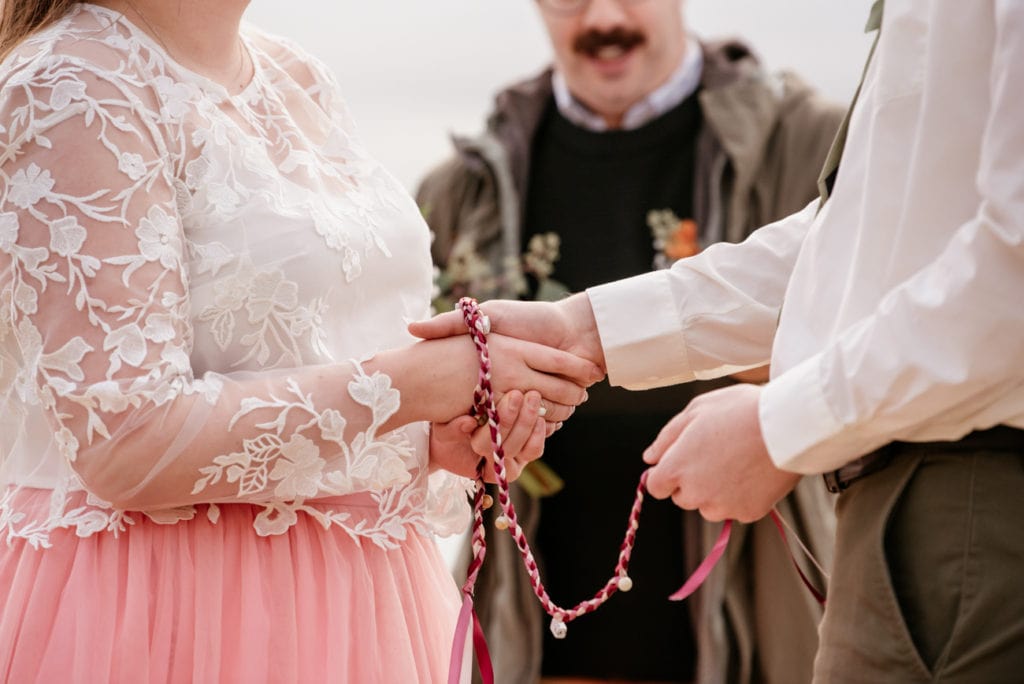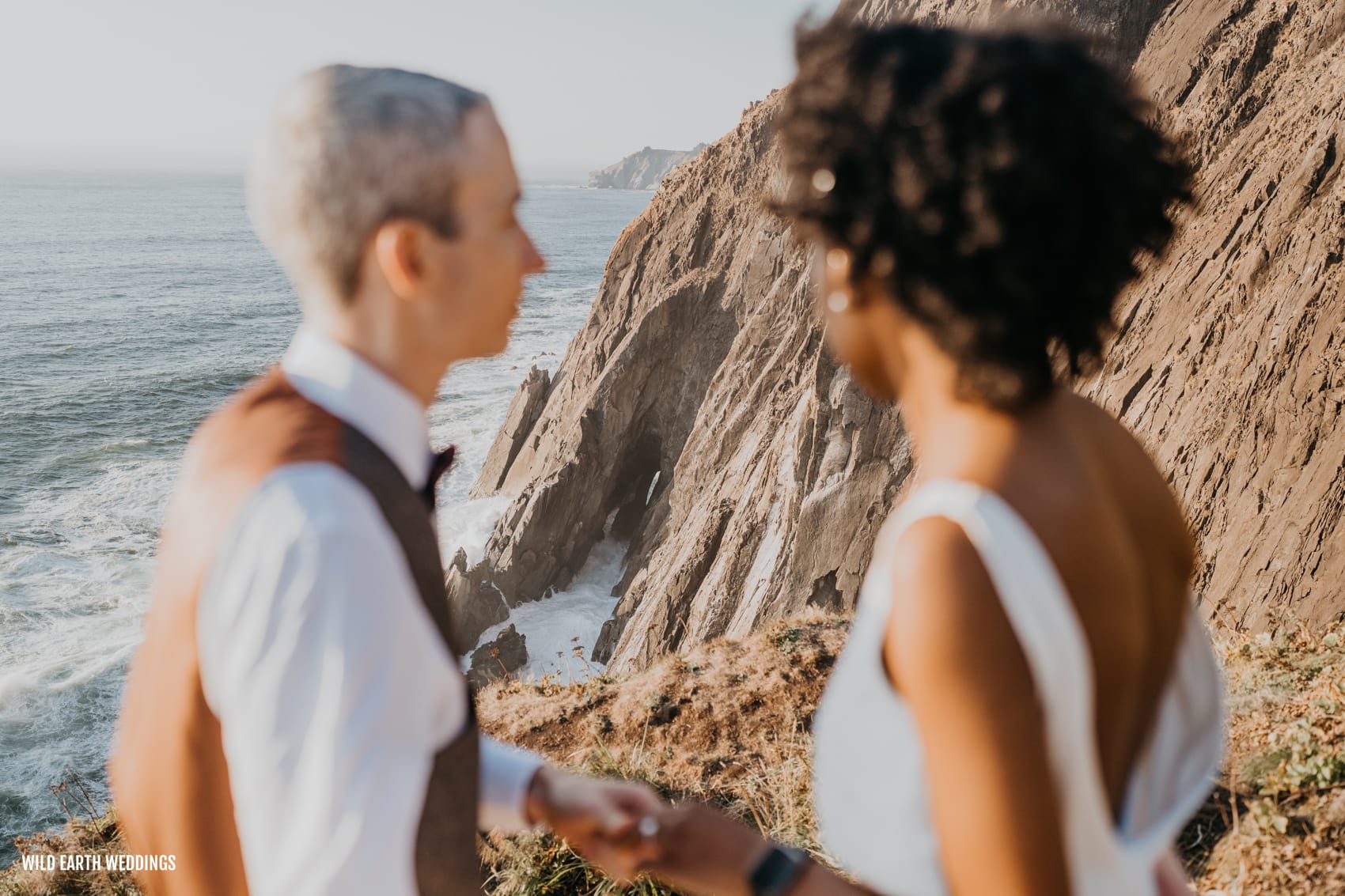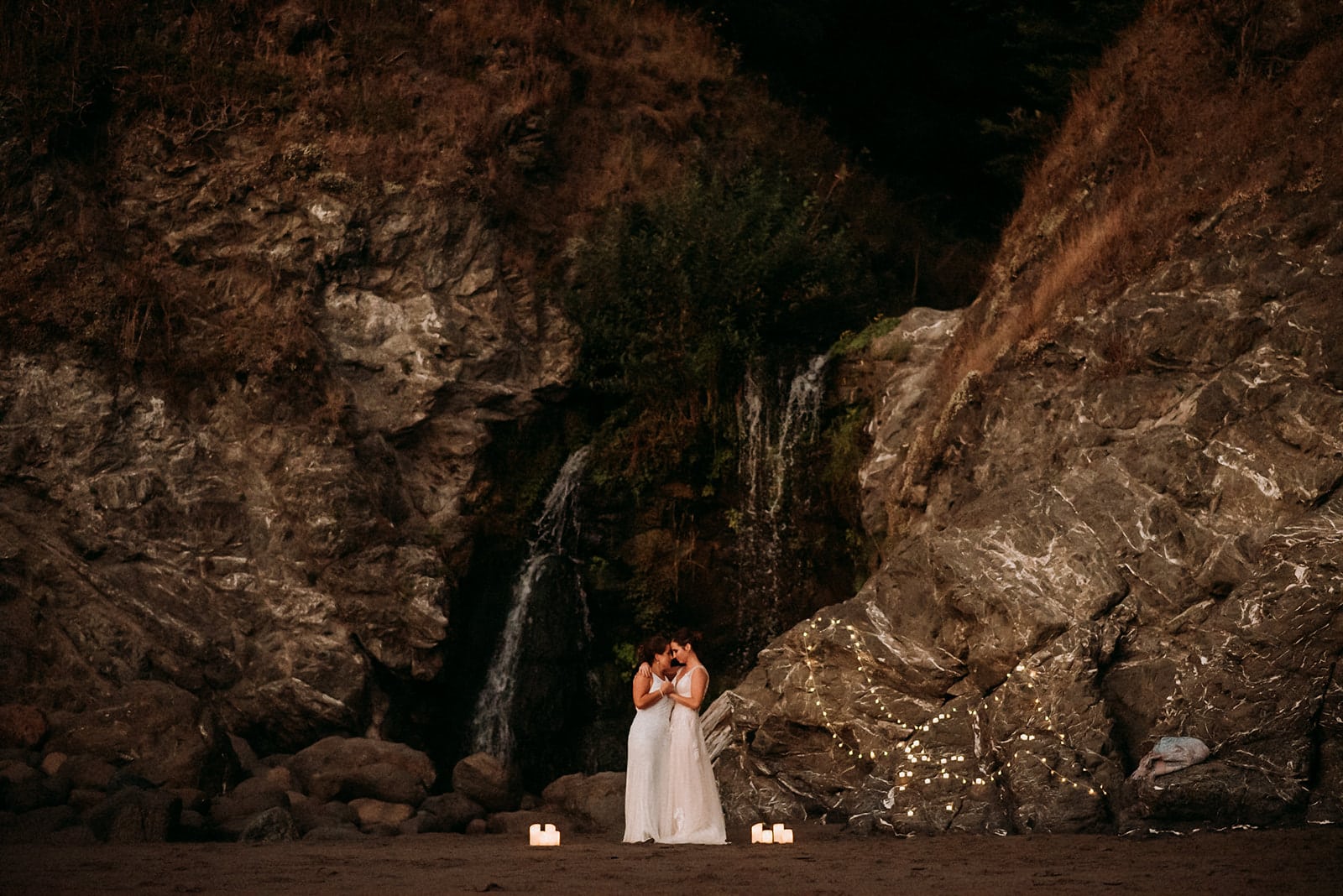Should you have an officiant at your elopement ceremony?

Some states require a licensed officiant to sign your marriage license, but that doesn’t mean you can’t exchange vows privately!
Don’t get hung up on the idea that your legal paperwork and your elopement ceremony have to be done simultaneously.
Here’s why:
Mutual Consent vs Permission from the State
I want to recognize and highlight the difference between a personal decision to marry made between two individuals vs permission granted by the state to access marital benefits. As the fight to legalize same-sex marriage taught us, legal permission has real value for the sake of dignity, equality, and for practical purposes such as the right to be involved in medical decisions and access to certain tax and custody benefits.
Still, I hate to see couples get hung up on the belief that these two acts be performed simultaneously. This is usually easy to navigate when planning a wedding but when planning an elopement, especially a destination or adventure elopement, couples get stuck.
Couples ask :
“How are we going to find an officiant willing to hike to the top of a mountain with us?”
“How do we get legally married overseas?”
“We just want a private ceremony, why do we need witnesses to sign our license?”
“We want to get married soon so I can get health insurance, but there’s no way I can plan a wedding by then!”
“My loved ones can’t travel, would it be ok to have more than one symbolic ceremony? Which one is legal?”
Because the legalities of state-recognized marriage vary from country to country and even state to state, I urge couples who are eloping to consider stripping the legal process of any emotional meaning.
Ask yourself what is important to you:
- Will it make a difference to you if your legal document says a different date or a different location than where you said your vows? (If it does, that’s valid!) If it doesn’t, would it help you have the ceremony you truly desire if you didn’t have to factor in the state’s regulations?
- Will it change you how conduct yourself in your marriage?
- Will it change how and when you decide to celebrate your anniversary?
- If so, how will you define that exact moment?
- Is it when you sign the license, or is it when it gets mailed in?
- Or what about when it’s filed at city hall, or when you receive your fancy certificate in the mail however many weeks later?
Marriage License vs Marriage Certificate
What’s the difference between a marriage license vs a marriage certificate anyway?
A marriage license can be thought of as applying for your marriage certificate.
When the license is granted, you know that if you get married (often within a window of time that the license is valid for), you’ll be able to get your marriage certificate.
Once you wed, you return your license; signed, officiated, witnessed or whatever else the state requires, and in return, usually a few weeks later, you receive your marriage certificate.
The certificate proves you are married. It’s the certificate that makes your marriage valid in the eyes of the government. It entitles you to benefits if you move to another state, or overseas. In the US, Marriages performed overseas are considered valid in the country where they take place if they are entered into in accordance with local law. (1)
Marriage Ceremonies are Already Symbolic
The institution of marriage has come a long way from political alliances between families. Apart from the legal practicalities and benefits mentioned above, these days marriages are colorful and varied and need only be governed by the rules set by the parties to the marriage.
Marriage remains as symbolic as the ceremony you had that declared yourself married. It only means something because you agree that it does. All ceremonies are rituals, and all rituals are symbolic. After all, the institution of marriage was a social contract long before it became a concern of the government.
Celtic history scholar Sharon Krossa notes “..for either method of late medieval marriage, for the marriage to be valid it did not matter if there were any witnesses or not. Witnesses only made it easier to prove. It did not matter if a priest was present or not. It did not matter if the marriage was blessed, or a mass followed, or not. It did not matter if banns had been posted in advance or not. It did not even matter if the marriage was consummated or not. A couple who exchanged consents in the present tense in the back woods with only squirrels for witnesses, against the wishes of their parents, and never had sexual intercourse was just as legally and bindingly married by the law of both church and state as a couple married by the Pope himself with the proud parents looking on and a child nine months later.” (2)
I personally love the idea of squirrels as witnesses, but I really appreciate how simple (and how startlingly progressive) medieval marriages were regarding consent.
Recognizing that marriage ceremonies boil down to pure symbolism doesn’t mean that those ceremonies aren’t important.
Once you are married, YOU will be charged with bringing meaning to that marriage, every day. Marriage ceremonies take up so much space in our lives and traditions because it’s important to mark the intention and the consent to commit to that daily promise of meaning.
I want you to free yourself (and your wedding day!) from worrying about the exact moment your marriage becomes legal in the eyes of the government. It’s so easy to think you need to do something the way everyone else does it- but you know better than that because you’re already rejecting the idea that you need a big traditional wedding!
So go ahead, elope overseas or in a different state.
File the paperwork 6 months before your ceremony if that is what you want or need to do! Say your vows on the top of a mountain or at the bottom of a waterfall. Fulfill your religious imperative at your ceremony, but don’t worry about changing plans for the state. It’s relatively easy to become legally married, and not being able to find an officiant willing to hike 12 miles doesn’t have to hold you back! (I want to recognize the privilege of marrying your partner is not universally available to LGBTQ couples worldwide. I hope that changes.)
Free your wedding! The county clerk’s office is not going anywhere.
Sources :
1 – U.S. Dept of State – https://travel.state.gov/content/travel/en/international-travel/while-abroad/marriage-abroad.html
2- Krossa, Sharon L – Medieval Scotland http://medievalscotland.org/history/handfasting.shtml
At Wild Earth Weddings, I believe that nothing is more beautiful, special, and fulfilling than having a wedding day that is 100% you.
I empower couples to seek the deeper meaning behind their intent to marry, and to carry that meaning with them into their marriage. Let’s do it!


WOW! I had no idea that these terms weren’t interchangeable! This is exactly the sort of information I am looking for for my upcoming elopement !
This is incredibly useful… Thank you for posting it
Such good information!!! I didn’t know half of this and find the officiant thing to sometimes be hard !!
This is all wonderful info! So many questions that I’ve heard before but was unsure how to answer. Thank you!
This is so helpful understanding the legal process of getting married!
Thank you for sharing this information. I had no idea a lot of these terms weren’t interchangeable.
Oh wow, this is all so helpful! Great, informative post!
Wow this is such valuable info!! Thanks for doing all of the work to clarify!
Great info for those planning to elope! Cuts straight to the nitty gritty.
Nice, informative post with pretty pictures to boot!